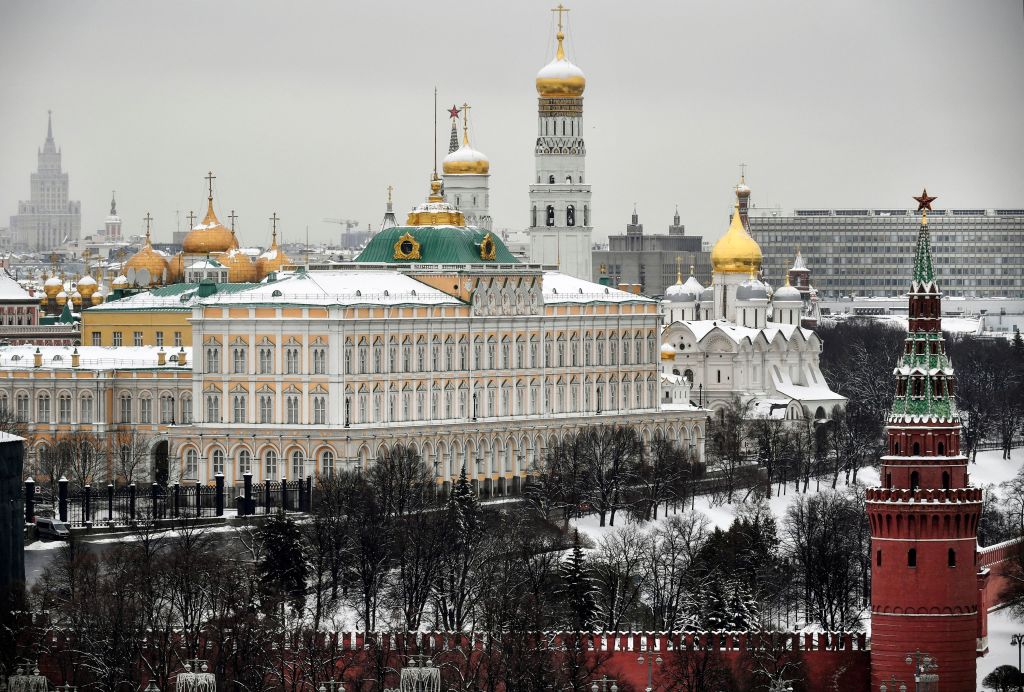War in Europe
When Joe Biden addresses the American people later today, he will find himself in a changed world. His Russian counterpart Vladimir Putin outlined an imperialist vision of Russia fit for a czar on Monday. In the early hours of this morning, he backed up that nineteenth-century sentiment with nineteenth-century action: the start of a full-scale great power conquest of a sovereign neighbor.
The events of the last twelve hours are something that my own end-of-history generation was brought up to believe would never happen in our lifetimes. And yet here we are. More recently, we were told that modern warfare was all cyber attacks and disinformation, deep fakes and propaganda. Maybe so, but it turns out it also involves a fair amount of artillery, tanks and attack helicopters too.
Many scoffed at the continual warnings from American and European governments of a full-scale invasion. But that is exactly what is happening. Snarky commentators on both the right and the left questioned why the US and its allies were exaggerating the risk of war, making infantile hints at a wag-the-dog effort by Biden to inflate foreign problems to distract from his domestic travails. How naive that now seems.
Putin has sent Russian men to die in Ukraine not over a narrow set of grievances but a grand delusion, a view of Russia’s place in the world that goes much further than complaints over relations between Ukraine and Western powers or written assurances over NATO expansion. In a piece for The Spectator, the historian Niall Ferguson compares Putin’s ambitions with that of his hero, Peter the Great.
As attention turns to the West’s response, the focus is on sanctions, more of which are certain to follow Putin’s drastic escalation. But the more pressing concern is surely the immediate demands of the war itself. In a compelling piece for Foreign Policy, A. Wess Mitchell argues for a US strategy that aims to make “such an insoluble ulcer that Putin eventually concludes, on the basis of Russia’s own interests, it is not worth the effort to try to conquer and subdue.” This means upping the ante with arms supplied to Ukraine: “Stinger missiles, counter-drone rifles, and mines, as well as an ongoing flow of anti-tank missiles and small arms ammunition.”
“Russia alone is responsible for the death and destruction this attack will bring, and the United States and its Allies and partners will respond in a united and decisive way. The world will hold Russia accountable,” said Joe Biden in a White House statement shortly after the attacks began.
There will be the question of how to punish Russia: which sanctions to deploy, and which, if any, to hold in reserve. But just as those measures cannot distract from the more urgent question of how to support Ukraine, they cannot delay a broader strategic adjustment to a world in which an unbridled Putin feels free to act in the way he has in Ukraine.
Washington must grapple with the difficult challenge of how to do its part against Russia without distracting from the rising threat from China. Many will argue that higher defense spending is now a priority. On the diplomatic front, the Biden administration surely needs to pivot away from its rhetorical commitment to restoring alliances to actually using those alliances to advance American interests. The administration in command of the largest army on the planet must find ways to persuade Europe to live up to its rhetoric by meeting defense spending obligations and weaning itself off Russian energy.
War in Ukraine is first and foremost a tragic development. And there will be much debate over how we got here. But the proximate cause is the decision of one man. And the priority must be ensuring that he pays a high price for his decision.
*** Sign up to receive the DC Diary in your inbox on weekdays ***
In Shevchenko’s shadow
There are two Ukrainian memorials in Washington. One, near Union Station, is a memorial to the victims of the Holodomor, Stalin’s genocidal famine. The other, not far from my home, is an imposing statue of Taras Shevchenko (1814-1861), the poet and champion of Ukrainian independence. The likeness of Ukraine’s national bard, a man exiled by Czar Nicholas I for his artistic assertions of Ukrainian identity and criticism of the Russian empire, is one of the grandest statues of a foreigner in the US capital.
It stood disappointingly unadorned on a cold, gray day in Washington when I walked past it this morning. Its inscription dedicates the memorial “to the liberation, freedom and independence of all captive nations.” The statue was unveiled by Dwight D. Eisenhower in 1964. Some 35,000 Ukrainian Americans processed from the Mall to the new statue, where the former president delivered his dedication: “My hope is that your magnificent march from the shadow of the Washington Monument to the foot of the statue of Shevchenko will here kindle a new world movement in the hearts, minds, words and actions of men; a never-ending movement dedicated to the independence and freedom of peoples of all captive nations of the entire world.”
To an extent most of us underestimated, yesterday’s battles are today’s battles.
American myopia
If there’s one thing the extremes on the left and the right share in their response to the Ukraine crisis, it’s a debilitating preoccupation with their domestic political foes. On his War Room show yesterday, former Trump lieutenant Steve Bannon delighted in the fact that Putin isn’t woke and asked “How many genders are there in Russia?” Meanwhile, opposition to American imperialism has long blinded many on the left to the crimes of America’s foes.
This crisis has revealed a dreary centrist version of this delusion too: a crippling obsession with Donald Trump that understands geopolitical events as first and foremost to do with the former president. Witness the many pundits who, even as Putin invaded a European nation on Biden’s watch, are worried about how much easier it might have been under Trump and are busy blaming the former president even though he is out of office.
Or consider the CNN contributor who drew “a straight line from Russia’s attack on the US election in 2016 to 1/6 to today’s new invasion of Ukraine.” The only person as obsessed with the former president is the former president himself. And his take on what is happening is as narcissistic as you’d expect. Russia is invading Ukraine, he speculated on Fox News last night, because of the rigged 2020 election.
What you should be reading today
Brahma Chellaney: The US and India in a new world
Daniel DePetris: The invasion the West had feared
Casey Chalk: Home is where the racism is
Michael Strain, National Review: The economic consequences of war in Europe
Stuart Lau, Politico: Putin puts China in a bind
Sam Adler-Bell, New York: Why are so many liberals mad at David Leonhardt?
Poll watch
President Biden Job Approval
Approve: 41.4 percent
Disapprove: 53.0 percent
Net approval: -11.6 (RCP Average)
What role do US voters want America to play in the Ukraine crisis?
A major role: 26 percent
A minor role: 52 percent
No role at all: 20 percent (AP/NORC Center for Public Affairs)


















